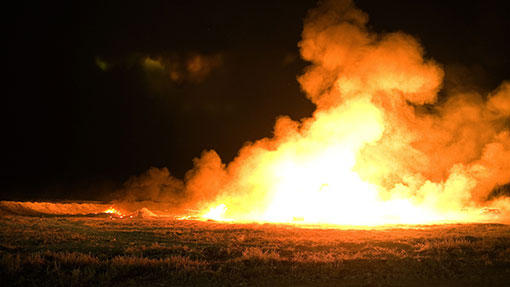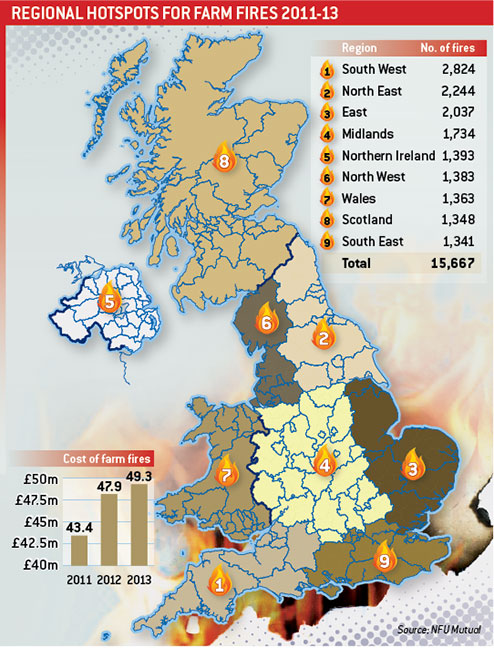Fires cost farming industry more than rural crime

The cost of farm fires has surged to more than £50m/year, eclipsing the cost of rural crime to agricultural businesses.
Figures from Britain’s largest rural insurer NFU Mutual show the cost of farm fires in England has risen by nearly £6m over the past three years, with up to 1,600 buildings and millions of pounds worth of crops and straw going up in smoke each year.
An investigation by Farmers Weekly into fire callouts across England also suggests a further rise in 2014.
See also: HSE farm safety tips: Bale stacking
Farmers Weekly has contacted fire services across the country to build a national picture of farm blazes since 1 June 2014.
Figures were supplied by 16 fire services, which show that since June there have been close to 300 callouts to incidents that can be classed as farm-based.
Fire prevention tips
- Keep bale stacks out of sight where possible
- Break large stacks into smaller blocks with a 10m gap
- Avoid storing kit, animals and straw in the same building
- Have a fire extinguisher to hand and make sure it is regularly maintained
- Check wiring on a regular basis
- Keep vermin under control to limit damage to wires
- Have a clear plan so firefighters know potential hazards
- Service machinery regularly
- Make sure hay is dry when baled and stacked to avoid spontaneous combustion
Source: NFU Mutual and Farmers and Mercantile
These are a fairly even mix of fires started accidentally and deliberately. In total, 46 of the fires involved baled hay or straw or a standing crop. Another 44 involved farm buildings.
One of the worst affected counties is Shropshire, which has attended 31 agricultural fires since the start of July alone – a number which it describes as a “definite concern”.
Four of these were tractors, eight barn fires and 14 were crop related. Eight of them have been confirmed as arson, 13 as accidental and 10 are still under investigation.
Derek Taylor, Shropshire fire crime officer, urged farmers to take greater precautions as the figures showed accidental fires were a problem as well as arson.
“We attended a barn fire this week where the farmer was welding and it caught on some material and chemicals in the barn. We need to make farmers more aware, so they take precautions before they start work and look at their surroundings.
“For example, a lot of farmers are working long hours and are tired and are perhaps not looking at whether straw or material is clogging their machine up. We need people to stand back and check if a machine is overheating.”
Tim Price, spokesman for NFU Mutual, said the company was concerned farm fires had been on the increase in recent years.
“We haven’t got a full picture of farm fires in July’s tinder-dry conditions, but it is already clear that there were an unusually high number of barn and straw stack fires in all arable areas of the UK.
“Farm fires make up the second largest part of our farm account claims bill after farm accidents. The scale of the problem shows how important it is to take all possible steps to prevent fires breaking out, and to have clear plans to evacuate people and livestock safely in the event of a fire and to make sure you have the right sort of fire extinguishers maintained in good order so you can fight small fires safely.”

Just how many of this year’s fires can be attributed to arson is not entirely clear. However, fires started deliberately are a problem – Kent has seen 10 incidents of baled straw or standing crop set on fire since 1 June 2014 and six are believed to have been started on purpose.
Pete Burbage, a farmer and contractor from Northamptonshire, said he’d had three stacks torched this year alone and in his view the situation was getting worse.
“We bale a lot of straw at this time of year and we’ve lost three stacks this year alone – all of which had been situated near the town of Corby. One was a big stack, the second was about 200 big bales and the third was 60 or 70. We also lost a stack of 500-600 bales two years ago.
“I do think the problem is getting worse and the true impact is hidden because not all of it will be claimed on the insurance. We haven’t claimed because while it is a big loss to take, I worry if I claim on every fire they won’t insure me.”
Mr Burbage estimated his losses as being at least £10/bale and having worked hard to bale and stack them it was incredibly disheartening: “I would sooner someone stole it. No one has gained anything. You wonder what the point of doing all the work is if it is going to get torched.”
